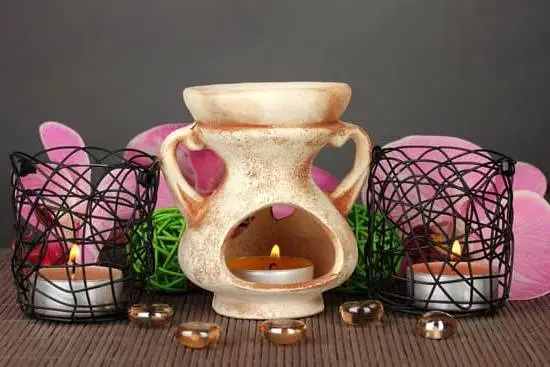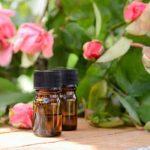Aromatherapy, the practice of using scents to promote wellbeing, has been recognized for its psychological benefits. The use of essential oils and scented products has gained popularity as people seek natural remedies for stress, anxiety, and other mental health issues. This article delves into the world of aromatherapy, exploring how different scents can impact emotions and mental state.
Aromatherapy has been around for centuries, with the use of fragrant plants and herbs dating back to ancient civilizations. Today, it is widely used as a complementary therapy to support mental health and emotional wellbeing. Understanding the science behind aromatherapy is essential in recognizing its potential to influence mood and cognitive function.
As we delve deeper into the topic, we will explore how specific scents have been shown to alleviate stress and promote relaxation. Additionally, we will investigate the role of aromatherapy in boosting mood and mental health, as well as its potential in supporting those dealing with anxiety and depression.
Finally, we will provide practical tips on incorporating aromatherapy into daily self-care routines for overall wellness. Stay tuned for an insightful journey into the world of aromatherapy and the profound impact it can have on our psychological wellbeing.
The Science Behind Aromatherapy
Aromatherapy has been found to have numerous psychological benefits, particularly in terms of how scents can affect the brain and emotions. Understanding the science behind aromatherapy can shed light on why certain scents have the power to calm, uplift, and improve mental well-being.
The olfactory system, which is responsible for our sense of smell, is directly linked to the limbic system in the brain. This part of the brain is associated with emotions, memories, and behavior. When we inhale certain scents, it triggers a response in the limbic system, leading to various psychological effects. For example, lavender and chamomile are known for their calming properties and can help reduce stress and anxiety.
When essential oils are inhaled or applied to the skin (in diluted form), they can stimulate the olfactory nerves and send signals to the brain. This process can lead to the release of neurotransmitters like serotonin and endorphins that promote relaxation and a sense of well-being. Additionally, certain scents can also impact brain waves, leading to improved focus and mental clarity.
The psychological benefits of aromatherapy extend beyond just mood enhancement; it also has the potential to provide relief for individuals struggling with anxiety, depression, or sleep issues. Incorporating aromatherapy into daily self-care routines can be an effective way to leverage these psychological benefits for overall well-being. Whether it’s through diffusing essential oils at home or using them as part of a relaxation ritual before bedtime, aromatherapy offers a natural and holistic approach to supporting mental health.
- Lavender: Known for its calming effects
- Peppermint: Can improve focus and mental clarity
- Bergamot: Helps reduce anxiety and promote relaxation
- Ylang Ylang: Uplifting scent that can boost mood
Aromatherapy for Stress Relief
Aromatherapy has long been used as a natural method for reducing stress and promoting relaxation. The use of specific scents in aromatherapy can have a powerful effect on the mind and body, helping to calm the nervous system and alleviate feelings of anxiety. Here are some key ways in which aromatherapy can be beneficial for stress relief:
- Lavender: Known for its soothing properties, lavender is one of the most popular scents used in aromatherapy for stress relief. It has been shown to reduce anxiety levels and promote a sense of calm.
- Chamomile: Another well-known scent for relaxation, chamomile can help to ease tension and promote better sleep. Its gentle aroma is often used to create a peaceful environment.
- Ylang Ylang: This exotic floral scent is often used in aromatherapy to reduce tension and promote feelings of joy and relaxation. It can help to lower blood pressure and calm the mind.
In addition to these specific scents, the act of inhaling pleasant aromas through essential oils can stimulate the olfactory system and trigger the release of neurotransmitters like serotonin and dopamine, which are known as “feel-good” hormones. This chemical response in the brain can lead to an overall sense of well-being, helping individuals better manage stress and maintain emotional balance.
By incorporating aromatherapy into their daily routines, individuals dealing with high levels of stress can benefit from the calming effects of certain scents, ultimately improving their psychological well-being. Whether through diffusers, bath products, or personal inhalers, there are various ways one can introduce aromatherapy into their lives to help manage stress levels and promote relaxation.
Overall, the psychological benefits of aromatherapy for stress relief are clear, offering individuals a natural and holistic approach to managing their mental health. As more research continues to support its effectiveness, aromatherapy remains a valuable tool for those seeking therapeutic methods for alleviating stress and maintaining emotional equilibrium.
Boosting Mood and Mental Health With Aromatherapy
As people become more aware of the psychological benefits of aromatherapy, the interest in using essential oils to improve mood and mental health has grown. Essential oils have been used for centuries to enhance emotional well-being, and research suggests that certain scents can have a positive impact on mood and cognitive function. The use of essential oils for psychological benefits is a holistic approach to emotional wellness that can be incorporated into daily self-care routines.
Aromatherapy works by stimulating the olfactory system, which is linked to the parts of the brain that control emotions and memories. When particular scents are inhaled, they can trigger responses in the brain that can affect mood and mental health. For example, lavender essential oil has been found to have calming effects and may help alleviate anxiety and stress. Similarly, citrus scents like lemon or orange can promote feelings of energy and alertness, making them helpful for boosting mood.
In addition to their direct effects on mood, essential oils can also be used as part of a larger self-care routine to support mental health. The act of engaging with aromatherapy – whether it’s through diffusing oils, using them in massage therapy, or incorporating them into bath time – can be a mindful practice that encourages relaxation and stress relief.
As individuals become more mindful of their own well-being, they may find that engaging with aromatherapy helps them reconnect with their emotions and find moments of peace amidst daily stressors. Overall, the psychological benefits of aromatherapy extend beyond simply inhaling pleasant scents; they encompass an entire approach to emotional wellness that supports mental health and overall well-being.
Aromatherapy for Anxiety and Depression
Aromatherapy has long been used as a natural remedy for managing anxiety and depression. The psychological benefits of aromatherapy have been recognized by many as an effective way to support mental well-being. Through the use of scented oils, aromatherapy can provide a holistic approach to alleviating symptoms of anxiety and depression, ultimately promoting a sense of calm and emotional balance.
Understanding the Effectiveness of Aromatherapy for Anxiety
Research has shown that certain scents have the ability to reduce feelings of anxiety and promote relaxation. When inhaled, these essential oils can stimulate the olfactory system, which is linked to the brain’s emotional center. For example, lavender oil has been found to have calming effects on individuals experiencing anxiety. By inhaling the scent of lavender, it can help lower heart rate and blood pressure, leading to a state of increased calmness.
Using Aromatherapy to Combat Symptoms of Depression
In addition to its benefits for anxiety, aromatherapy can also be helpful in managing symptoms of depression. Scents like citrus, bergamot, and ylang-ylang have been associated with boosting mood and reducing feelings of sadness or lethargy. These essential oils can be diffused or applied topically with carrier oils to promote feelings of happiness and positivity. Incorporating aromatherapy into daily self-care routines can provide much-needed support for those dealing with depression.
Integrating Aromatherapy Into Mental Health Practices
Many individuals have integrated aromatherapy into their mental health practices as a complementary therapy alongside traditional treatment methods. Whether through inhalation or direct application on the skin, scented oils have shown promise in providing support for individuals navigating anxiety and depression. It is important to note that while aromatherapy can offer psychological benefits, it should not replace professional medical intervention but rather serve as a supplemental tool in promoting overall well-being.
The utilization of aromatherapy for anxiety and depression is based on enhancing emotional balance through natural scents that target specific areas in the brain responsible for regulating mood and emotions. As more research continues to support the efficacy of aromatherapy in mental health care, individuals are encouraged to explore this ancient practice as part of their holistic approach towards emotional wellness.
Enhancing Cognitive Function With Aromatherapy
Aromatherapy has long been utilized for its potential to enhance cognitive function, improving focus, and promoting mental clarity. The psychological benefits of aromatherapy can be seen in how certain scents can help individuals concentrate better, stay alert, and boost their overall cognitive performance. By understanding the science behind these scents and their impact on the brain, individuals can incorporate aromatherapy into their daily routines to support their mental acuity.
Research has shown that specific essential oils have the ability to improve cognitive function. For example, peppermint oil has been found to enhance memory and alertness when inhaled. Similarly, rosemary oil has been linked to improvements in cognitive performance and mental clarity. These scents work by stimulating the olfactory system, which then triggers a response in the brain that can lead to increased focus and concentration.
Incorporating aromatherapy into daily self-care routines can be a simple yet effective way to enhance cognitive function. Whether it’s through diffusing essential oils while working or studying, using scented candles during meditation or mindfulness exercises, or even applying a drop of oil to pulse points throughout the day, individuals can benefit from the psychological effects of aromatherapy on their cognitive abilities.
| Essential Oil | Cognitive Benefit |
|---|---|
| Peppermint | Enhances memory and alertness |
| Rosemary | Improves cognitive performance and mental clarity |
The Role of Aromatherapy in Sleep and Relaxation
Aromatherapy has long been used to promote relaxation and improve sleep quality. The psychological benefits of aromatherapy in this context are well-documented, with certain scents proving to be particularly effective in creating a calming and soothing atmosphere conducive to restful sleep.
The Power of Lavender and Chamomile
Two of the most widely recognized scents for promoting relaxation and better sleep are lavender and chamomile. Studies have shown that these essential oils can help reduce anxiety levels, slow down heart rate, and even improve overall sleep quality. These scents are often used in diffusers or added to bath water as a means of creating a tranquil environment before bedtime.
Creating a Bedtime Ritual
Incorporating aromatherapy into a bedtime routine can also signal to the brain that it’s time to wind down and prepare for sleep. By consistently using the same scent or combination of scents at bedtime, individuals can create a Pavlovian response that triggers feelings of relaxation and drowsiness. This type of conditioning through scent association can be a powerful tool in improving sleep patterns over time.
Enhancing Relaxation Techniques
Aromatherapy can also enhance other relaxation techniques such as meditation, deep breathing exercises, or gentle yoga stretches before bed. By incorporating calming scents into these practices, individuals may find themselves better able to let go of the day’s stressors and ease into a state of mental tranquility that is conducive to falling asleep more easily. The use of aromatherapy in conjunction with other relaxation methods can compound the psychological benefits and ultimately lead to improved sleep quality.
Incorporating Aromatherapy Into Daily Self-Care Routines
The psychological benefits of aromatherapy are far-reaching and multifaceted. Whether it’s using calming scents for stress relief, uplifting oils for boosting mood, or supportive blends for managing anxiety and depression, there are various ways in which aromatherapy can positively impact our mental state. By incorporating aromatherapy into daily self-care routines, individuals can create moments of calm and relaxation amidst the hustle and bustle of modern life.
In today’s fast-paced world, prioritizing mental health and emotional well-being is more important than ever. Aromatherapy offers a natural and accessible way to support psychological wellness, allowing individuals to enhance their cognitive function, promote better sleep and relaxation, and ultimately improve their overall quality of life. By integrating the tips for using essential oils in everyday life outlined above, anyone can begin to experience the transformative effects of aromatherapy on their psychological health.
Frequently Asked Questions
How Does Aromatherapy Help Mentally?
Aromatherapy can help mentally by promoting relaxation and reducing stress and anxiety. The inhalation of essential oils can activate the limbic system, which is responsible for emotions and memories, leading to improved mood and mental well-being.
What Are the Physiological and Psychological Benefits of the Essential Oils?
Essential oils can have physiological benefits such as reducing inflammation, relieving pain, and improving sleep quality. Psychologically, they can help reduce anxiety, improve mood, and enhance cognitive function. Overall, essential oils can have a positive impact on both the body and mind.
What Are the Psychological Benefits of Aromatherapy Massage?
Aromatherapy massage not only provides physical relaxation but also offers psychological benefits. The combination of essential oils with massage therapy can promote a sense of calmness, reduce stress levels, and improve overall mental well-being. It can also be an effective way to release emotional tension stored in the body.

Are you looking for a natural way to improve your health and wellbeing?
If so, aromatherapy may be the answer for you.





